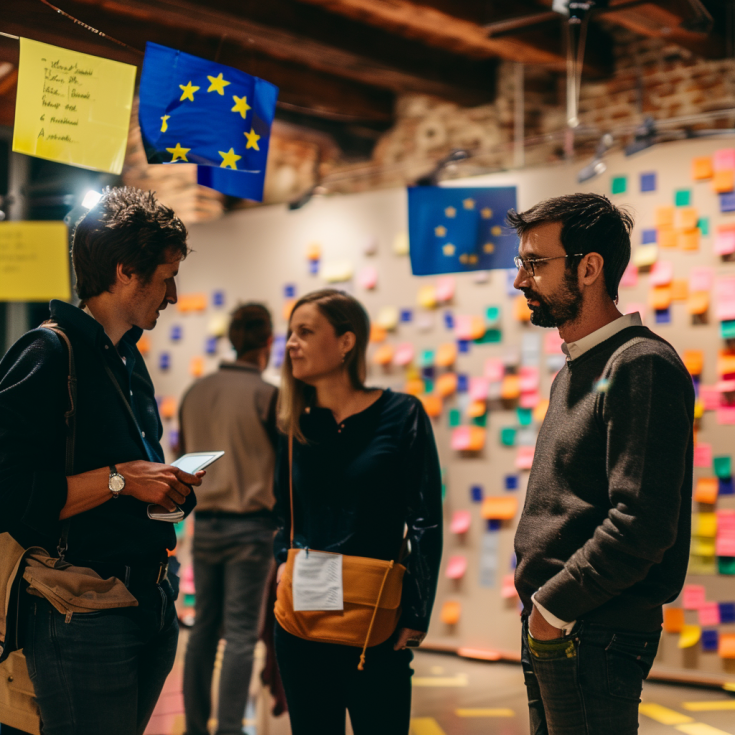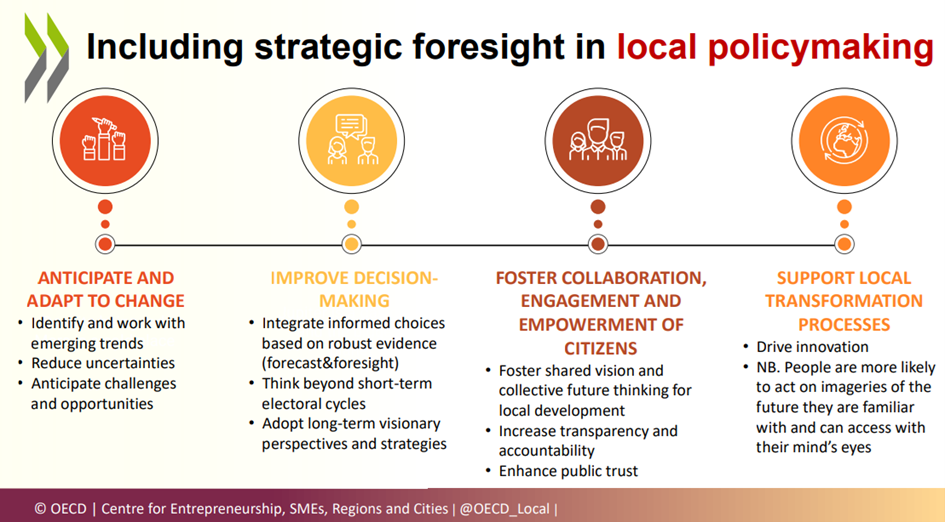Strategic and Participatory Foresight

On Tuesday 21 May, the Policy Learning Platform held a webinar on the topic of Strategic and Participatory Foresight.
In this webinar, we explored inspiring solutions, practices, and valuable guidance and recommendations, all supported by real-life examples from Interreg Europe projects.
Explore the recording, key learnings and presentations below.
Webinar agenda
The webinar has been designed and moderated by Arnault Morisson and Marc Pattinson, Thematic Experts for a Smarter Europe.
00:00:58 Introduction by Arnault Morisson and Marc Pattinson.
00:14:20 Presentation by Katerina Ciampi Stancova, Policy Analyst at the OECD Trento Centre for Local Development, Italy, on the latest trends of strategic foresight.
00:33:45 Q&A - What strategic foresight tools are available to the regions?
00:37:18 Presentation by Cristian Matti, from European Commission’s Joint Research Centre (JRC), Spain, on the application of Strategic Foresight for innovation in policy making.
00:53:24 Q&A - Could you share some exemplary dashboards that effectively monitor and support regional strategic foresight?
00:56:10 - Presentation by Andreja Hlišč from the Chamber of commerce and industry of Slovenia and Simona Vernon, from TECOS, Slovenia on the Slovenian ecosystem and the "future Key skills and Competences for I4.0" project. (SMARTY Project)
1:10:05 Presentation from Johanna Dahl, Regional Council of Ostrobothnia, Finland, and Mona Elnell Nilsson, University of Vaasa, Finland, on the example of the Transition Labs for open, inclusive and responsible place-based innovation processes
1:22:07 Panel discussion
1:23:07 Q&A - In implementing the Labs in the Ostrobothnia region, did you receive any co-funding from the region, or were most of the costs covered by European projects?
1:25:15 Q&A - How can we translate these mega trends into formats that are adaptable for a specific region or city?
1:30:06 Q&A - Policymakers often operate within short time frames due to election cycles. How can we engage them in such projects that extends beyond these cycles?
Key learnings
Strategic foresight is a structured and systematic approach to thinking about the future avenues and anticipating and preparing effectively for changes. It focuses on exploring different possible futures and the opportunities and obstacles they might bring. These insights are then used to improve decision-making and take proactive action in the present (OECD).
At the regional level, strategic foresight can be combined with participatory approaches. Participatory foresight engages a broad range of stakeholders, including citizens, in shaping future scenarios collaboratively, aiming to democratise decision-making and foster long-term thinking for informed collective action.
Key Insights for Local and Regional Policymakers

Source: OECD
Regions aiming to conduct foresight exercises must build appropriate capacities and seek support from foresight experts, such as those from the Competence Centre on Foresight. Addressing specific regional challenges and understanding the specific system’s dynamics can motivate regions to engage in strategic foresight.
Strategic foresight can unite stakeholders around a shared vision of the future. For instance, a region aiming to lead in the circular economy needs active stakeholder support for new scenarios. Concrete pilot actions are crucial for transitioning from visioning to tangible results.
Good practice: RIPEET Project
The RIPEET project engaged diverse stakeholders in Transition Labs to facilitate place-based energy transitions. Key aspects of the Transition Lab process included:
- Activating the regional ecosystem to jointly formulate a vision and define innovation needs for energy transitions.
- Quickly linking funding through open calls to address the identified challenges and needs.
- Ensuring co-creation throughout the process and in funded pilots.
These labs aimed to co-create visions, generate transition pathways, and implement solutions collaboratively.
Good practice: Future Key Skills and Competences for I4.0
Foresight exercises are crucial for assessing and anticipating regional skills. In Slovenia, the Strategic Research and Innovation Partnerships (SRIP) - Factories of the Future (FoF) identified 12 future skill profiles necessary for adopting Industry 4.0 technologies. These include professional, interpersonal, management, and personal competencies. This initiative can inspire other industrial regions to assess and prepare for the skills needed for digital and green transitions.
More information:
Read the OECD proceedings on Capacity building for innovation in regional development
Read our policy brief on regional missions
Presentations
Download the presentations below.